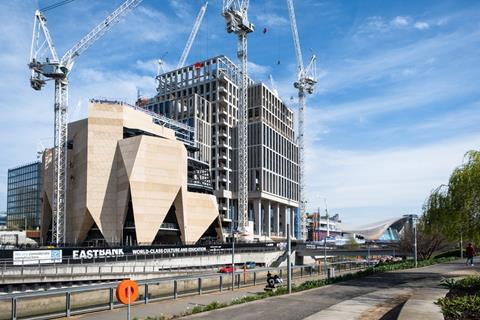News on summer boost in output overtaken by shock of Kwarteng’s tax giveaway three weeks ago
Construction output grew in August for the second consecutive month driven by strong growth in infrastructure, official figures said today.
But the numbers are likely to get worse from September with housebuilder Barratt this morning announcing that private reservations had fallen on the figure recorded for its last financial year “as customers react to the wider economic uncertainty” following chancellor Kwasi Kwarteng’s mini-budget less than three weeks ago.
According to the Office for National Statistics, the volume of construction work increased 0.4% in the last month of summer marking two months of growth after it revised July’s figure upwards to 0.1% from an initial contraction of 0.8%.

However, in a trading update, the country’s biggest housebuilder gave a foretaste of what was to come when it said the average weekly figure for private reservations had fallen from 281 for the 2021/22 year as a whole to 188 from 1 July to 9 October, a drop of one third.
It also said reservations per site per week since the publication of its results on 28 August had dropped to 0.48, which is 47% down on the 0.90 recorded in the same period in 2021.
The firm, which said pre-tax profit for 2022/23 would still be in line with expectations, added: “The private reservation rate in the period reflects customer response to increased wider economic uncertainty, where growing cost of living concerns have been compounded by increased mortgage interest rates and reduced mortgage availability.”
According to the ONS, the value of work in August was up £60m to just over £15bn with growth coming solely from an increase in new work (1.9%), as repair and maintenance declined (2.0%)
According to the ONS, anecdotal evidence gathered from businesses suggested the cost of living crisis was leading businesses and households to spend less on repair and maintenance.
For the second consecutive month, all three repair and maintenance sectors saw a fall on the month – the 2% overall fall for R&M is the fourth in the last five months.
Only three out of nine sectors contributed to growth – infrastructure (5.3%), private industrial (4.3%) and private housing new work (1.7%).
>> Strong construction wage growth outstripped by inflation, says ONS
>> Third of consultants expect trading conditions to worsen over next 12 months
Across the three months to August, construction saw a slight increase of 0.1%, again driven by new work. But it is the slowest rate of growth in the three-month-on-three-month series since the period to October 2021, when output fell 0.7%.
Anecdotal evidence received from returns for the Monthly Business Survey for Construction and Allied Trades and the Business Insights and Conditions Survey referenced increased prices for concrete, plaster, bricks, sand, gravel and asphalt-related products.
Firms also reported labour shortages and difficult working conditions, as warm weather continued in August after the record-breaking temperatures of July.


























No comments yet